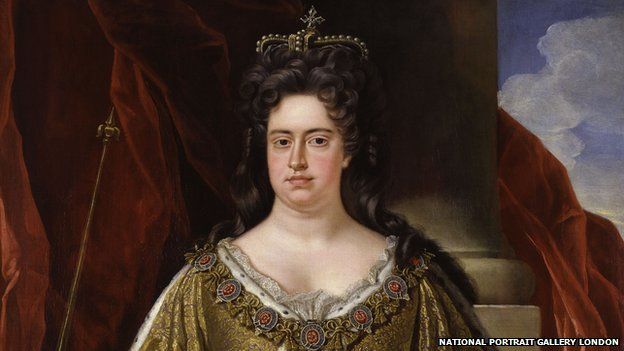Scotland's constitutional crisis 300 years ago
- Published

The last Stuart monarch, Queen Anne, died 300 years ago on August 1, 1714. Her death at the age of 49 re-ignited the controversy surrounding the Act of Union which had abolished the independent Scottish Parliament and led to the Jacobite uprising of 1715.
Despite having had at least 17 pregnancies, none of the Queen's children survived infancy.
Her failure to provide an heir caused a major crisis in the newly-created Great Britain.
Historians now say the episode has resonance for the debate surrounding the Scottish independence referendum.
In 1701 the English Parliament had passed the Act of Settlement nominating the Protestant Elector of Hanover as Anne's successor.
But the Scottish Parliament - the Estates of Scotland - had other ideas, and passed its own legislation, the Act of Security in 1704, stating its own right to choose the queen's successor to the Scots throne.
It said: "The foresaid estates of parliament convened or meeting are hereby authorised and empowered to nominate and declare the successor to the imperial crown of this realm and to settle the succession thereof upon the heirs of the said successor's body, the said successor and the heirs of the successor's body being always of the royal line of Scotland and of the true Protestant religion, providing always that the same be not successor to the crown of England."
Professor Murray Pittock of Glasgow University said the Elector of Hanover, who became George I, was largely unknown and of distant relationship to the Scottish Royal line.
His eventual succession to the British throne was of particular concern in Scotland where the Union had not been universally popular.
"The death of Queen Anne, and the succession of George I which went with it, clearly signalled to Scotland both that the Union would be irreversible, and also that the Stuart line would definitely be excluded from the throne," he said.
"Scotland felt doubly excluded from the top table."
The union of the parliaments meant the Scots Act of Security being repealed. But Professor Chris Whatley of Dundee University said Queen Anne's death fanned simmering resentment in Scotland.
"One of the main reasons the Union was insisted upon by England - by Queen Anne as it happens - was that the Scots were not going to agree with their Act of Settlement," he said.
"The key thing here was that Anne and her ministers wanted to ensure a Protestant successor to her on her death."
Jacobite rising
A year after Anne's death, the Earl of Mar raised the Jacobite standard and more than 20,000 men rallied in the 1715 uprising to the cause of the Old Pretender, declared James VIII of Scotland.
Prof Pittock said support for the Jacobite cause was most significant north of the Tay, with Catholics and Episcopalians prominent.
He said: "It is very much a native rising, and it was very likely that it was going to happen once it was clear that George I was going to succeed Anne and also clear that the Union was here to stay."
Professor Whatley said although the 1715 rising failed, it had highlighted the way Scots felt the Union was developing.
"Few politicians in England had been interested in Union in the first place," he said.
"There was a perception amongst English Tories that we were poor and we would be demanding hand-outs and support for Scotland's economy.
"And they didn't want to be involved in that."